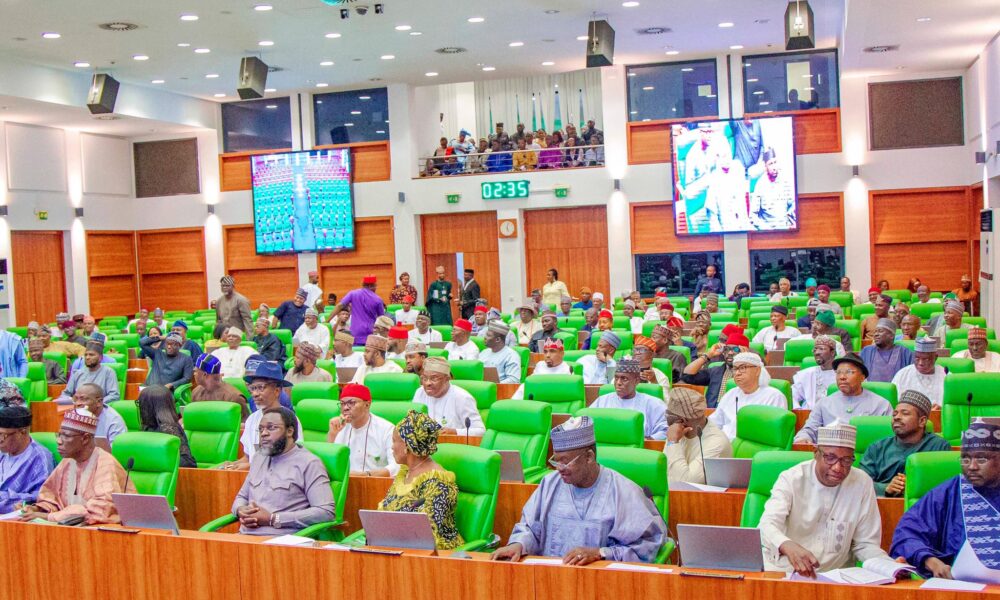Headline
House of Reps moves to review regulations on cryptocurrency, POS activities

The House of Representatives has launched an Ad-hoc Committee to examine the regulations, risks, and security challenges surrounding cryptocurrency adoption and Point-of-Sale (PoS) operations in Nigeria.
Speaking during the inauguration ceremony in Abuja on Monday, Speaker of the House, Tajudeen Abbas, explained that the move became necessary following rising cases of fraud, cybercrime, and consumer exploitation linked to digital financial transactions across the country.
Abbas stressed that while technological innovation in the financial sector has improved convenience and accessibility, it has also created new vulnerabilities that demand urgent attention and effective regulation.
He recalled that in November 2024, the House had directed the Central Bank of Nigeria (CBN) Governor, Olayemi Cardoso, and Chief Executive Officers of commercial banks to appear before lawmakers to propose practical solutions to the growing challenges in the PoS and cryptocurrency ecosystem—particularly the lack of proper documentation and traceability of PoS users nationwide.
The decision of the House followed the consideration and adoption of a motion sponsored by the member representing Ehime/Mbano/Uboma/Obowo Federal Constituency, Imo State, who argued that cases of fraudulent activities within the financial system have been established against POS users, adding that there is “A necessity to combat such illicit practices and safeguard the integrity of financial transactions within Nigeria.”
The House said it was aware that undocumented POS transactions create a loophole for fraudulent activities, such as identity theft, money laundering, and unauthorised transactions, noting that “By enforcing the documentation of users’ identity, the incidence of fraud will significantly reduce and the security of financial transactions in Nigeria will be enhanced.”
According to the Speaker, a regulatory framework has become necessary to address the loopholes identified in the works of virtual assets service vendors.
“It is because of the absence of clear rules, coupled with the volatility and complexity of the technology, that the House of Representatives found it imperative to establish regulations and consumer protection measures that will regulate the activities of Virtual Assets Service Providers, including cryptocurrencies and crypto assets.
“This Ad-hoc Committee is therefore necessary. Its main job is to undertake public hearings to collate relevant information from stakeholders that will guide the House in developing legislation for a regulatory framework for the adoption of the currency in our economy.
“Its work will also guide the House in its oversight functions as they concern the use of digital currency in Nigeria,” he said.
In his remarks, the Chairman of the Committee, Olufemi Bamisile (APC-Ekiti), said it is the duty of the Committee to ensure a balance between financial innovation and national security.
“We have been entrusted with a task of national significance: to review the economic, regulatory, and security implications of cryptocurrency adoption and Point-of-Sale operations in Nigeria.
“Across the world, financial systems are being reshaped by technology. In Nigeria, cryptocurrency and POS operations have grown rapidly, creating new opportunities for commerce, financial inclusion, and innovation.
“But alongside these opportunities lie serious risks of cybercrime, fraud, money laundering, terrorism financing, and regulatory uncertainty,” he said.
The lawmaker assured that the committee’s work will dwell on developing a legislative and regulatory framework that encourages innovation while protecting citizens and the integrity of the nation’s financial system.
The House said it was aware that undocumented POS transactions create a loophole for fraudulent activities, such as identity theft, money laundering, and unauthorised transactions, noting that “By enforcing the documentation of users’ identity, the incidence of fraud will significantly reduce and the security of financial transactions in Nigeria will be enhanced.”
According to the Speaker, a regulatory framework has become necessary to address the loopholes identified in the works of virtual assets service vendors.
“It is because of the absence of clear rules, coupled with the volatility and complexity of the technology, that the House of Representatives found it imperative to establish regulations and consumer protection measures that will regulate the activities of Virtual Assets Service Providers, including cryptocurrencies and crypto assets.
“This Ad-hoc Committee is therefore necessary. Its main job is to undertake public hearings to collate relevant information from stakeholders that will guide the House in developing legislation for a regulatory framework for the adoption of the currency in our economy.
“Its work will also guide the House in its oversight functions as they concern the use of digital currency in Nigeria,” he said.
In his remarks, the Chairman of the Committee, Olufemi Bamisile (APC-Ekiti), said it is the duty of the Committee to ensure a balance between financial innovation and national security.
“We have been entrusted with a task of national significance: to review the economic, regulatory, and security implications of cryptocurrency adoption and Point-of-Sale operations in Nigeria.
“Across the world, financial systems are being reshaped by technology. In Nigeria, cryptocurrency and POS operations have grown rapidly, creating new opportunities for commerce, financial inclusion, and innovation.
“But alongside these opportunities lie serious risks of cybercrime, fraud, money laundering, terrorism financing, and regulatory uncertainty,” he said.
The lawmaker assured that the committee’s work will dwell on developing a legislative and regulatory framework that encourages innovation while protecting citizens and the integrity of the nation’s financial system.
He added that the committee will collaborate closely with key regulatory and security agencies such as the Central Bank of Nigeria and Securities and Exchange Commission, the Nigeria Deposit Insurance Corporation, Nigerian Financial Intelligence Unit, Economic and Financial Crimes Commission, Independent Corrupt Practices and Other Related Offences Commission, as well as the Nigeria Police Force.
He stated that the committee will adopt a consultative and evidence-based approach, engaging stakeholders such as regulators, banks, fintech operators, civil society, and the security community in public hearings to gather diverse perspectives.























